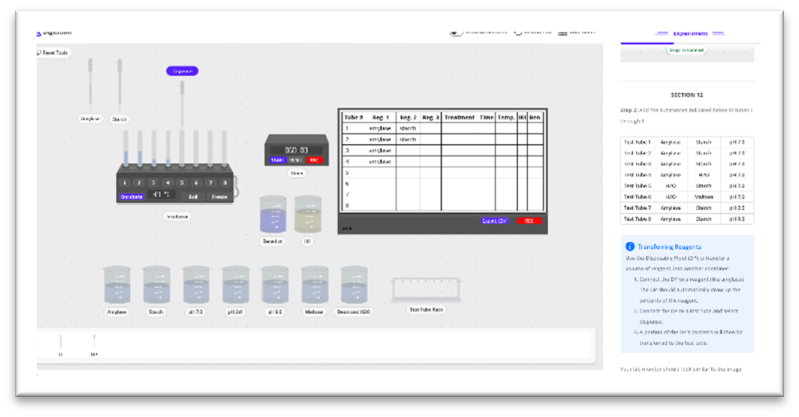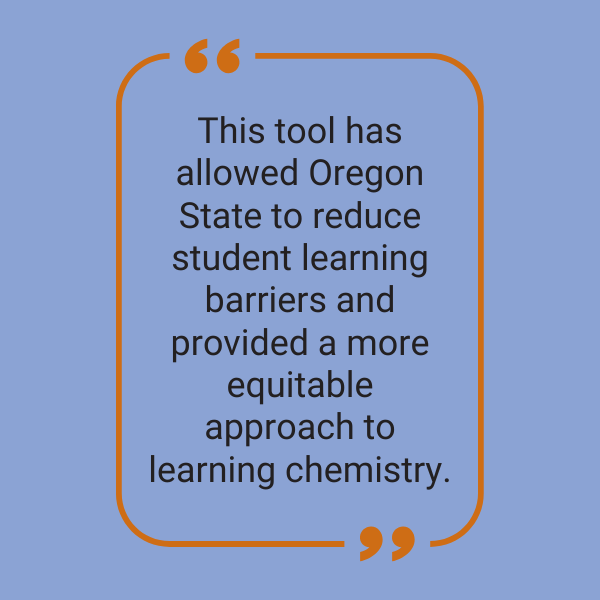Increasing Access to Learning by Creating a Custom Online Lab Platform
Published by: WCET | 4/6/2023
Tags: Digital Learning, Distance Education, Lab Courses, Managing Digital Learning, Online Learning, STEM, Student Success
Published by: WCET | 4/6/2023
Tags: Digital Learning, Distance Education, Lab Courses, Managing Digital Learning, Online Learning, STEM, Student Success
A few weeks ago we started our feature of recent WCET Outstanding Work (WOW) Award winners. Today we continue that feature with one of our WOW Honorable Mentions – Oregon State University Ecampus and their outstanding work developing a custom online lab platform. Thank you to Karen Watté, the Director of Course Development & Training with Ecampus for sharing about the platform and the team’s design journey!
Enjoy the read,
Lindsey Downs, WCET
For years higher education has grappled with the question – how do you teach labs online? For many faculty this has felt like an insurmountable hurdle. However, the Oregon State University Ecampus course development team was able to bound over this hurdle for chemistry courses taught online through a multi-year collaborative effort with Oregon State’s Department of Chemistry. The result was the development of a robust online chemistry lab platform that is now used in 10 online chemistry courses serving approximately 1500 students annually.

Our online chemistry lab consists of both a digital workbench and notebook. It is designed in many ways to replicate what one would see in a physical lab. For example, the balance uses a variable weight scale tare function and students are required to actually close the balance door prior to recording an accurate measurement. They are also required to swap pipette tips between drawing and dispensing solutions. This level of detail creates an extremely realistic virtual experience. The user-friendly design means that the technology disappears into the background and learning takes center stage.

Labs conducted through this platform meet the same learning outcomes as required for on-campus labs and students leave the online courses well-prepared for future coursework and lab experiences. At the time of its launch, the online lab platform actually covered a wider range of experimentation and data analysis than the on-campus lab experience, according to Mike Lerner, previous chemistry department head. The platform was designed to be scalable, so new labs can be added and existing labs can be revised. This ability to respond quickly to changing needs provides a significant advantage over out-of-the-box solutions.
The journey that ended with this complex simulation began with a number of key decisions, the most important of which was whether this was a project that we could, and wanted to, develop in-house. Previous experience with an external vendor had resulted in a product that wasn’t as flexible as hoped. Reliance on an outside vendor also brings business continuity risk as ownership and support for a product can shift over time. Our Ecampus team had programming capacity and expertise, but we also considered a number of other factors before deciding to develop this platform internally.
Based on our experience, here are some critical questions that you might consider before tackling a large, custom media project like this one.
What are some of the advantages that we’ve realized at Oregon State as a result of creating a custom lab platform? Here are a few:

Flexibility – A custom lab platform provides ultimate flexibility for faculty since they are able to request changes without having to enter into negotiations with an external vendor.
Accessibility – For students who need certain accommodations to work in a physical lab, an online lab can often meet this need. From another perspective, students who would otherwise be unable to attend an in-person lab (i.e. active duty military) have the opportunity to complete the course of study.
Cost savings – Physical space is not only costly but often at a premium at most institutions. Being able to support a certain percentage of lab-work online means that physical labs on campus can be used for highly specialized or upper-division coursework.
Security – An in-house platform takes advantage of the security infrastructure and policies within the institution which helps ensure that student data remains secure.
The development of an online chemistry lab platform was a significant undertaking involving two full-time programmers, a project manager and part-time graphic design support over the course of two years. The results, however, have been extremely positive.
As a land grant institution, access is a high priority and part of our mission. The virtual lab platform has improved access to our undergraduate chemistry courses, and it offers even more value to students because it’s free. Students don’t pay any lab or licensing fees.
This tool has allowed Oregon State to reduce student learning barriers and provided a more equitable approach to learning chemistry.
WCET Steering Committee, Senior Director, Course Development and Training, Oregon State University Ecampus